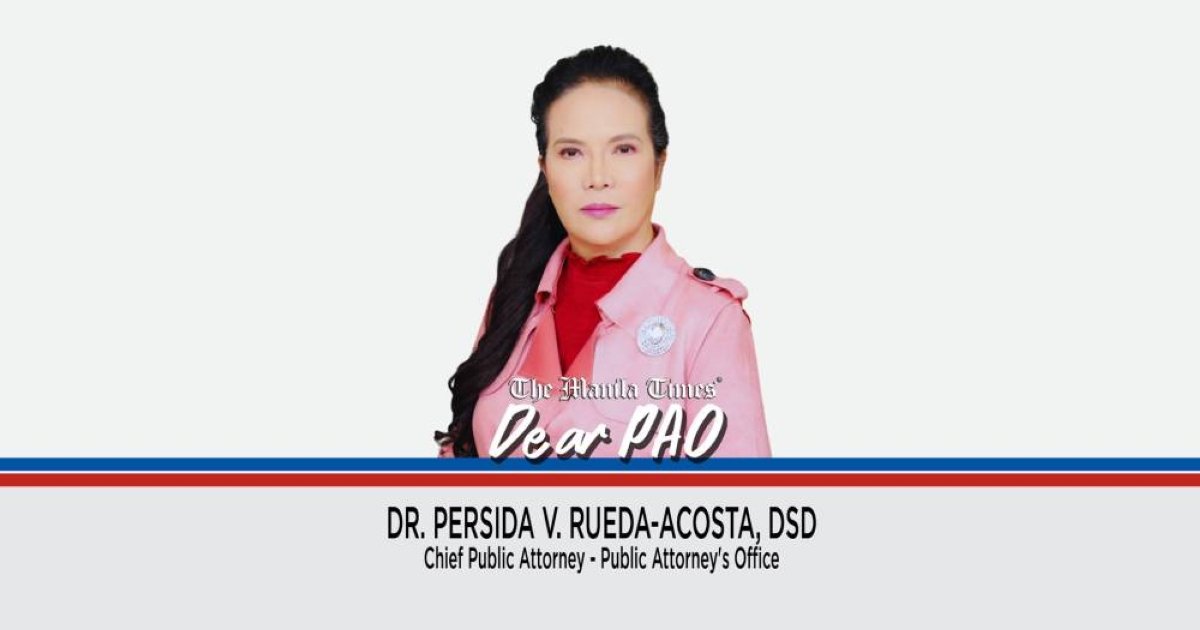DEAR PAO,
My son, who is suffering from a mental illness, hacked his cousin to death. Before the incident, my son attempted to commit suicide on many occasions. Also, he is suffering from insomnia and cannot recall his actions, even the most recent ones. Most of us observe that when we have a conversation with him, he is caught blank staring and would not respond. We plan to testify and raise this issue to support his status as an imbecile and exempt him from criminal liability. Is there any guideline set by the Court in availing the insanity defense?
Solidad
Dear Solidad,

Paragraph 1 of Article 12 of the Revised Penal Code provides the following:
“ARTICLE 12. Circumstances Which Exempt from Criminal Liability. – The following are exempt from criminal liability:
“1. An imbecile or an insane person, unless the latter has acted during a lucid interval.
“When the imbecile or an insane person has committed an act that the law defines as a felony (delito), the court shall order his confinement in one of the hospitals or asylums established for persons thus afflicted, which he shall not be permitted to leave without first obtaining the permission of the same court.”
In People v Formigones, GR L-3246, Nov. 29, 1950, through Associate Justice Marcelino Montemayor, the Supreme Court came up with a strict parameter on inquiry pertaining to insanity defense. It held:
“In order that a person could be regarded as an imbecile within the meaning of article 12 of the Revised Penal Code so as to be exempt from criminal liability, he must be deprived completely of reason or discernment and freedom of the will at the time of committing the crime. The provisions of article 12 of the Revised Penal Code are copied from and based on paragraph I, article 8, of the old Penal Code of Spain. Consequently, the decisions of the Supreme Court of Spain interpreting and applying said provisions are pertinent and applicable. We quote Judge Guillermo Guevara on his Commentaries on the Revised Penal Code, 4th Edition, pages 42 to 43:
“‘The Supreme Court of Spain held that in order that this exempting circumstance may be taken into account, it is necessary that there be a complete deprivation of intelligence in committing the act, that is, that the accused be deprived of reason; that there be no responsibility for his own acts; that he acts without the least discernment; that there be a complete absence of the power to discern, or that there be a total deprivation of freedom of the will. For this reason, it was held that the imbecility or insanity at the time of the commission of the act should absolutely deprive a person of intelligence or freedom of will, because mere abnormality of his mental faculties does not exclude imputability.'”
Considering that the legal insanity standard laid out in the said Formigones case requires complete deprivation of intelligence, the Supreme Court observed that this parameter follows that the presence of reason, even in its slightest, before, during and after the commission of the crime instantly overthrows the defense of insanity. Another observation expressed in People v. Lito Paña, GR 214444, Nov. 17, 2020, penned by Senior Associate Justice Marvic MVF Leonen, is that such a stand is “a concept born out of the narrow view that rejects the psychodynamic nature of human psychology. It fails to acknowledge that mental illnesses exist in a spectrum, and its all-or-nothing notion of mental illnesses reflects a detachment from established and contemporary concepts of mental health.”
In the same case, the Supreme Court likewise clarified the Formigones standard and laid the following: “We now use a three-way test: first, insanity must be present at the time of the commission of the crime; second, insanity, which is the primary cause of the criminal act, must be medically proven; and third, the effect of the insanity is the inability to appreciate the nature and quality or wrongfulness of the act.”
Finally, the insanity must be proved by clear and convincing evidence, and not by proof beyond reasonable doubt. As further discussed by the Supreme Court in the Paña case:
“Verily, insanity is not an element of the crime that should be demonstrated with proof beyond reasonable doubt. The defense only bears the burden of disputing the presumption of sanity. Ultimately, the defense must proffer evidence of insanity sufficient to overcome the presumption. This quantum of evidence is not necessarily proof beyond reasonable doubt.
“In criminal cases involving pleas in the nature of confession and avoidance, clear and convincing evidence is sufficient to acquit the accused. For instance, defendants interposing self-defense are only required to demonstrate self-defense by clear and convincing evidence. In cases where the justifying circumstance of defense of strangers is invoked, this Court likewise only requires proof by clear and convincing evidence. The same quantum of evidence applies to cases where the defense of state of necessity is invoked. Likewise, proof of other exempting circumstances only requires clear and convincing evidence.”
Following the foregoing, it is clear that in order to avail the defense of insanity, the accused’s insanity must be medically proven since the degree and nature of the accused’s mental illness can be best identified by medical experts unless there are extraordinary circumstances and that there is no other evidence available. Second, the accused’s insanity must be present at the time of the commission of the crime. Lastly, the effect of the accused’s insanity is his inability to appreciate the nature and quality or wrongfulness of the act. Absolute or complete deprivation of intelligence is no longer required.
We hope that we were able to answer your queries. This advice is based solely on the facts you have narrated and our appreciation of the same. Our opinion may vary when other facts are changed or elaborated on.
Editor’s note: Dear PAO is a daily column of the Public Attorney’s Office. Questions for Chief Acosta may be sent to [email protected].










